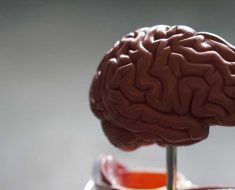Do you have trouble focusing or completing tasks? Or do you ever feel restless or fidgety and can’t seem to stop? These are common signs of ADHD. You may find this surprising if you don’t have an official ADHD diagnosis, but as it turns out, many adults have been living with ADHD and don’t recognize it, according to the Adult ADHD Self-Report Scale (ASRS-v1.1) Symptom Checklist. There are a number of reasons why ADHD goes undiagnosed, from lack of awareness of the condition to symptoms presenting differently based on gender, but either way, it is a condition your doctor can diagnose and help treat. You may have questions, which is completely understandable, but it’s important to know you’re not alone and that you have options.
The overall prevalence of adult ADHD is 4.4%, according to the National Institute of Mental Illness. And although symptoms start in early childhood and continue into adulthood, adult ADHD symptoms may not be as clear as ADHD symptoms in children. In adults, hyperactivity may decrease, but struggles with impulsiveness, restlessness, and difficulty paying attention may continue, according to Mayo Clinic. If you think you may have undiagnosed ADHD, below are some self-screening questions that can be used as a starting point to help you recognize symptoms associated with the disorder that you can discuss with your doctor. Please note, that if you suspect you may have ADHD, you should consult your physician for an accurate diagnosis.
The following questions were taken from Part A of The Adult ADHD Self-Report Scale (ASRS-v1.1) Symptom Checklist, which was developed in conjunction with the World Health Organization (WHO), and the Workgroup on Adult ADHD. Each question is answered as either never, rarely, sometimes, often, or very often.
How often do you feel overly active and compelled to do things, like you were driven by a motor?
People with ADHD show a persistent pattern of inattention and/or hyperactivity-impulsivity that interferes with functioning or development, according to the CDC. In adults, these symptoms and feelings of inattention would have to be present for at least 6 months in order for it to be considered ADHD.
How often do you fidget or squirm with your hands or feet when you have to sit down for a long time?
This can often be overlooked as a symptom as parents can see this as a part of normal childhood behavior. However, if you’re still exhibiting this behavior as an adult, whether you have trouble sitting still in meetings, or during your child’s school play, then you may need to talk to a healthcare professional about it.
When you have a task that requires a lot of thought, how often do you avoid or delay getting started?
Speaking from personal experience, I sometimes have a tough time starting projects if I know it will take me a while. However, once I get started, I’m usually okay to knock it out. The difference between me and someone with ADHD is that while there may be a delay, I’m able to complete it, while someone with ADHD may have trouble in that area.
How often do you have problems remembering appointments or obligations?
Memory problems are a frequently reported symptom in adult ADHD, and it is well-documented that adults with ADHD perform poorly on long-term memory tests. It’s been suggested that these memory deficits in adults with ADHD can reflect a learning deficit, according to a medical article from the National Library of Medicine.
How often do you have difficulty getting things in order when you have to do a task that requires organization?
Getting organized may be one of the main challenges associated with ADHD. It can often leave adults with the condition feeling overwhelmed and anxious when they have a task or project and don’t know where to start to get everything in one place. However, with proper medication and/or organizational tips and tools, people with the disorder can maintain order and a routine.
How often do you have trouble wrapping up the final details of a project, once the challenging parts have been done?
Difficulty focusing and staying on task for people with ADHD may have to do with sustained attention, the ability to focus on an activity or stimulus over a long period of time. This can be extremely frustrating for people with ADHD, especially when it comes to the near end of a work project. So, if you’re mentally checking the “very often” box when it comes to this question (or all of the above for that matter), contact your doctor for an appointment.
To make the most of your visit, Qelbree offers a Doctor Discussion Guide to help facilitate the conversation between you and your doctor. All you have to do is answer 3-5 questions regarding your current treatment experience to receive your customized (and free!) discussion guide.
ADHD is often misunderstood, which can make it difficult to diagnose, especially in adults. It impacts multiple facets of life i.e. work and relationships, but there are treatment options available that can help you live the life you deserve. Ask your doctor about Qelbree, a once-a-day non-stimulant ADHD medication.
INDICATION
Qelbree® (viloxazine extended-release capsules) 100mg, 150mg, 200mg is a prescription medicine used to treat ADHD in adults and children 6 years and older.
IMPORTANT SAFETY INFORMATION
Qelbree may increase suicidal thoughts and actions, in children and adults with ADHD, especially within the first few months of treatment or when the dose is changed. Tell your doctor if you or your child have (or if there is a family history of) suicidal thoughts or actions before starting Qelbree. Monitor your or your child’s moods, behaviors, thoughts, and feelings during treatment with Qelbree. Report any new or sudden changes in these symptoms right away.
See below for additional safety information.
You should not take Qelbree if you or your child:
Take a medicine for depression called a monoamine oxidase inhibitor (MAOI) or have stopped taking an MAOI in the past 14 days. Also, you or your child should avoid alosetron, duloxetine, ramelteon, tasimelteon, tizanidine, and theophylline.
Qelbree can increase blood pressure and heart rate. Your or your child’s doctor will monitor these vital signs.
Qelbree may cause manic episodes in patients with bipolar disorder. Tell your doctor if you or your child show any signs of mania.
Do not drive or operate heavy machinery until you know how Qelbree will affect you or your child. Qelbree may cause you or your child to feel sleepy or tired.
The most common side effects of Qelbree in patients 6 to 17 years are sleepiness, not feeling hungry, feeling tired, nausea, vomiting, trouble sleeping, and irritability, and in adults, insomnia, headache, sleepiness, tiredness, nausea, decreased appetite, dry mouth, and constipation. These are not all the possible side effects of Qelbree.
This article was created by SheKnows for Supernus.
Source: Read Full Article





